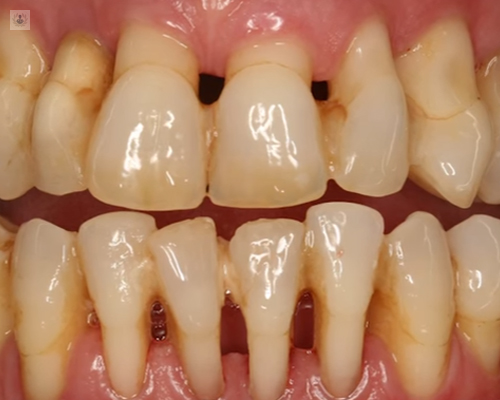periodontitis
Written by:
What is periodontitis and what types are there?
Periodontitis, or what they formerly called pyorrhea, is a chronic inflammatory disease associated with bacteria. Fundamentally, these bacteria will produce a destruction of the support system, both the periodontal ligament which is what grabs the tooth bone, bone and soft tissue. Fundamentally there will be a series of associated symptoms when it appears that periodontitis is bleeding and there are others such as suppuration, bad taste in the mouth, the separation of the teeth, the fanning also of these teeth.

There are two types: the chronic form that is quite common and can be given at any age but fundamentally we will find it in adults. Then there would be another type that would be the acute form, that here the bacteria are very aggressive and produce a great destruction of tissue and bone, and produce pain and also of soft tissue. In this case there would be a very rapid loss of bone with the consequent loss of teeth and great pain. Basically we will find a series of symptoms such as bleeding, oozing and loss of teeth.
What is the role of periodontitis as a risk factor in cardiovascular diseases?
Periodontitis we already know that it is a chronic inflammatory disease caused by bacteria. These bacteria and their metabolites pass directly into the bloodstream and from here spread through the rest of the body. Fundamentally in this case of cardiovascular diseases go to the heart area and what they will promote is the production of atherosclerotic plaques, which are those of cholesterol, which mature and eventually release them, sometimes producing myocardial infarctions and strokes.
What adverse effects does it have on pregnancy?
We have seen that periodontal diseases are chronic inflammatory diseases associated with bacteria, these bacteria pass into the bloodstream and spread throughout the rest of the body. In this case, they fundamentally go to the fetoplacental junction and produce an immune response altering the development of the fetus. There is a high risk of suffering in pregnancies with moderate or severe periodontitis risk pregnancies, with premature children, children of low weight and preclaimsia.
Is it a modifying factor for certain diseases, such as diabetes mellitus and respiratory diseases?
Periodontal disease and diabetes mellitus are chronic inflammatory diseases that have high markers of inflammation. This produces an immune response and there is a high risk in diabetic patients of developing periodontitis. Regarding lung diseases, there would be chronic obstructive pulmonary disease. It has been seen that in patients that severe periodontitis is a factor in the production of this EPOB. In addition, it has also been associated in the scientific literature to nosocomial pneumonias, mainly in patients who are hospitalized who aspirate dental plaque and develop these pneumonias. Therefore, in patients with poor oral hygiene or periodontitis, pneumonia can develop.
How can we treat it?
Once diagnosed, the treatment may consist of a basic treatment, which would consist of scaling and root planing or in some more complicated cases would go through some small surgeries. Fundamentally apart from surgical treatment, it is essential to follow up on these patients that the frequency of visits to the dentist would depend on the severity of the periodontal disease.


